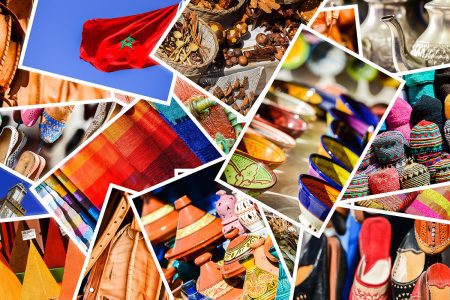While ecotourism, responsible tourism, sustainable development and environmental protection are key themes, and Morocco is focusing on the development of rural tourism, what is the real state of ecology in Morocco?
Ecology in Morocco is neither pink nor green
On the whole, the picture for tourists is not very positive. The sight of the outskirts of the cities, covered in black plastic bags that blow away in the first breath of wind, the household rubbish lying around in the streets, the fumes from cars, lorries and outdated buses that blacken the landscape as soon as you need to step on the accelerator, for example to cross the Tichka pass, the industrial fumes, particularly, but not only, towards Safi whose phosphates attack the nose, eyes and lungs, the veritable fog that can descend on Casablanca in the event of pollution combined with the heat, the poor quality of the water, the used batteries that heat up in the sun, the absence of any recycling, none of this is very green.
If we look a little deeper, there are a number of issues that are more than worrying. Desertification is gaining ground, not only “as everywhere”, in the Saharan strip, but also on the slopes of the Atlas mountains, which used to be heavily wooded, because wood is used for heating, faster than it can be renewed. This photo, taken on the slopes of the Jaffar cirque, near Imilchil clearly shows the extent of the damage.

Water management is a cause for concern.
Between poor sanitation, the needs of agriculture in the region of Agadir et du Sous where market gardeners, even more than orchards, consume an enormous amount and drill ever deeper wells, the development of tourist needs might seem anecdotal.
However, the water consumption of major tourist towns such as Marrakesh or Agadir is such that there is almost a shortage every summer.
The The gardens that adorn the kingdom, the flower beds that are abundantly planted in all the towns and cities beautify the urban landscape, but consume a lot of water. As for swimming pools, whether in riads in Marrakesh or in the kasbahs of our semi-desert south, they are an ecological and environmental aberration (but we’ve said enough about that on the blog not to go into it again).
The need to raise ecological awareness
While MREs (Moroccans living abroad, or ‘summer residents’ as they’re known) often have environmentally-friendly habits, these are not yet widespread among the population. You’ll be given two or three plastic bags for every purchase (and I’m always surprised when I refuse them), and many simply ‘push’ the rubbish further away.
What was possible – even desirable – just a few decades ago, when plastic, mercury batteries and Coke cans hadn’t taken over everything, is now causing serious problems. Not only do we have to collect rubbish, we also have to recycle it efficiently, instead of leaving behind what we have no use for.

It used to be very little, but now it’s a lot. And above all, it’s no longer biodegradable. Plastic cans, for example, are replacing earthenware jars and skins. And they don’t have the same environmental impact.
Water in particular is not seen as a scarce resource.
This is probably what surprised me most, compared with Namibia or Egypt, where every hotel has a sign explaining that water must not be wasted (and in Namibia, in many places, you have to pay for it).
Here in Morocco, water is not promoted. Hotels don’t provide information, swimming pools are plentiful even in the desert, and Moroccans wash their homes with copious amounts of water, running their showers for long periods in order to rediscover the pleasures of the hammam (but you go to the hammam once or twice a week, you shower every day, and several times a day in times of drought).
Entire villages, such as Aït Ben Haddou are supplied by tanker lorries, because the water, which passes through the layers of mineral salts in the High-Atlas, is unfit for human consumption. The wastewater collection systems in the villages still function correctly, according to traditional models, but water is becoming increasingly scarce. There are no controls on the quantities of pesticides and insecticides used by the large farms in the Sous and Haouz regions, which pollute the water tables….
Eco-friendly hotels are rare in Morocco. Many people talk about “solidarity tourism” and “sustainable development”, but few actually do anything about it (a forthcoming post will introduce you to a selection of ecolodges in Morocco or to accommodation that actually makes an effort).
In short, although the main issue is elsewhere, Moroccans are polluters, and are generally unaware of their impact – a problem of education and awareness.
However, efforts are being made, and the royal impetus has been given. More tomorrow :)
I reread this post when I wrote the one on the weaknesses of Moroccan tourism.
A lot of progress has been made in ten years
The ban on ‘micas’ (plastic bags), which has been imperfectly enforced, has greatly improved the Moroccan landscape. Their replacements, non-woven bags, are not much better from an ecological point of view, it seems, but they recycle better than plastic bags.
The renewal of taxi fleets, the improvement of public transport and stricter standards for the import of second-hand vehicles have also improved things: we see less and less of these big black clouds.
Recycling, at least on the small scale of the craft industry, is now widespread. Tyres are recycled into furniture or shoes, plastic bags into rugs or baskets… but glass, for example, is only recycled by ragpickers, who are still reduced to scavenging with their carrossa for a few dirhams!
Much more remains to be done
About water management in particular. The Moroccan government is perfectly aware of water stress and the significant drop in the water table, and is setting up equipment (dams, humidity sensors in the deep south, and soon a desalination plant).
However, the general public is still not aware of the issue. Differential water pricing for the tourism sector is politically unworkable. Tourism and agriculture are in competition, with agriculture taking the lion’s share, of course.
There has even been the crazy idea of planting watermelons in the Zagora region, but the villagers, deprived of water, are protesting strongly.
 A typo or syntax error? You can select the text and hit Ctrl+Enter to send us a message. Thank you! If this post interested you, maybe you can also leave a comment. We'd love to exchange with you !
A typo or syntax error? You can select the text and hit Ctrl+Enter to send us a message. Thank you! If this post interested you, maybe you can also leave a comment. We'd love to exchange with you !




